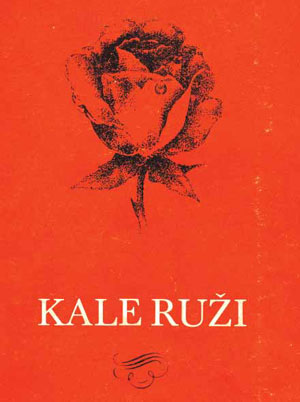The director of the Private secondary school in Kežmarok
Anna Koptová_ Cerná ruže - ....pdf (423082)

M.A. Anna Koptová is among those personalities for whom actions speaks louder than words. At the time of unfreedom she wrote poems about the desire to save and uplift the Romani language and culture, but since the 90s she doesn`t have a time for writing poetry .
Anna Koptová was born on Novembre, 7, 1953, in Slovenská Ves, which is located near Kežmarok, in district of Poprad. Her father, Gustav Klempár, came from a famous musical family. During the 1950s and 1960s he was the bandmaster of folk ensemble Magura, which was created in Tatraľan textile factory in Kežmarok, where he also worked manually. When the children grew up, her mother started to work as a laborer. Parents supported their nine offspring in education, wished for their children to achieve the higher living standard through schools. The eldest daughter studied high school, which was in the early sixties unusual also for non-Roma relations. Anna Koptová had known since elementary school, that she want to become a journalist. She was fascinated by work with information and especially the possibility to affect the world around her and relationships between people in a positive way. She graduated at high school in Kežmarok (in a present it`s the secondary school). In 1977 she graduated at Department of Journalism, Faculty of Philosophy, Comenius University in Bratislava. At this time, thanks to her elder sister, a teacher in kindergarden, she met Milena Hübschmannová, who introduced her to the world of material poverty and cultural richness of Roma settlements, so different from the official doctrine about life in socialism.
Shortly after taking his first job in East Slovakia Newspaper, where she had work as a journalist, she participated in the 2nd Congress of the IRU (International Romani Union) held in Geneva in 1978. Meetings with Roma activists from around the world and experiences associated with subsequent pressure from State Security (she and her relatives were under close supervision of StB: intimidation, forced to cooperation with State Security, disabling her Brother`s studies), forced her to take a negative attitude towards politics of the Communist Party not only in relation to Roma. She had to change a job, her opinions about self-determination of ethnic Roma were considered as "hostile for people of Czechoslovakia".
www.facebook.com/mozes.solomon/videos/694668867388568/
Untill the Velvet Revolution in 1989 she worked as an editor at the newspaper of Engineering Construction in Košice, during the years 1990-1992 she became a Member of the Slovak National Council (National Parliament). Together with 10 other Roma representatives she push for legislative basis of Roma national minority, the creation of preparation classes (zero classes), Roma Conservatory, professional Roma theater (Romathan based in Kosice). Koptová was also a first director of Romathan in 1992-1998.
Together with Elena Lacková and Miroslav Lacko she founded in 1991 The Cultural Association of citizens of Roma origin and began to publish the newspaper Romano ľil/ Roma sheet. She is a chairwoman of the Association to promote the education of the Roma in the Slovak Republic, she is the founder and director of the Foundation Good Romany Fairy Kesaj (inspired by imaginary creature, which restores sight to Roma and teaches people to give a goodness to others), which focuses on education, culture , publishing activities and legal protection of ethnic minorities.
Since 2003, the Foundation Good Romany Fairy Kesaj is a founder and Anna Koptová is the first director of the Private Roma secondary school education schools - Private Romany secondary school at the Galactic street in Košice, which became a pilot school in applying the education of Roma in Roma language. She also work at standardization of the Romany language as a member of the expert group, which is preparing new rules of Roma language, she participated in the promotion of subjects Romani language and literature and Romani realities in primary and secondary schools.
She compiled Romany- Slovak dictionary Rómčina do vrecka (Košice , 1995). For the theater Romathan she translated into Romani language classic tragedy of Federico Garcia Lorca Blood Wedding , musical Gypsies go to heaven and many more translations of dramas. She is married and she has two daughters , the elder of them is completing her studies of Romany culture and Indology at Charles University in Prague.

Until the mid-90s she has published her poems in Roma periodicals. Currently she doesn`t write poems. In Almanac of Roma poetry of eleven authors Kale Rose (Black Rose), which was prepared for publication and translated to Czech language by Milena Hübschmannová are published three of her poems: Dživeha (in English: You will live, which was translated to Czech language by Anna Žigová), Lungo Drom (A long road) and Čučipen (Emptiness).
In the introduction to her debut, she wrote: "I began to write in Romani language in winter of 1988. The life had brought me to it. And also verses and stories of other Roma that fell into my hands. I was amazed, when I have realised how beautiful is Romani language. "Anna Koptová show us in her debut, that she has a knowledge of the literary canon and the rules of poetics. She uses skillfully the accumulation of words with kindred meaning, and that way she show us the richness of Romani language, with poetic figure repetition she achieved the urgency of the message of poems and a rhytmic cadence. A poem Emptiness compare favorably with modern poetry, in which isn`t important the nationality of author – in general, it references to the human existential experiences.
The article was published in Romano voďi 7-8 / 2010
Author of the article: Lenka Jandáková


